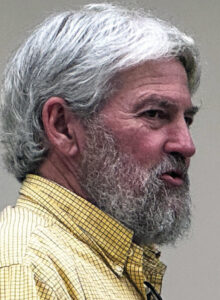County highway department leads state in the way work is done
The Franklin County Highway Department has been busy in recent weeks working on several road projects, including projects funded through the Alabama Transportation Rehabilitation and Improvement Program (ATRIP).
This may seem like business as usual for the highway department, but in fact, it’s a unique situation since the Franklin County Highway Department is the only county highway department in the state of Alabama that has been approved by the Federal Highway Administration and the Alabama Department of Transportation to conduct the full depth reclamation and cement stabilization of the affected roadways by force account – a fact that has saved the county millions of dollars over time.
Franklin County Highway Engineer David Palmer said full depth reclamation is a process many people are probably unaware of, but it’s something that is vital to getting smoother, better riding roads as well as roads that are more durable and cost efficient.
“Full depth reclamation is basically recycling the road that is already there in order to stabilize the base the new road will be on top of,” Palmer said.
“It’s a vital part of the process and something the highway department discovered could be done by our own workers instead of contracting the work out in order to save money and make our projects more cost efficient.”
Palmer said the county highway department began doing their own full depth reclamation 15 years ago when he was searching for a solution to structural failures in the foundation of the county road system.
“After I had been in Russellville for five or six years, I began to realize our biggest problem was base failures,” Palmer said.
“This was due mainly to the natural materials we have in our county. We have a high clay content with gravel mixed in, which is a good material, but we don’t have a lot of sand in the mix.
“What happens is the clay actually absorbs water like a sponge and causes a ‘swelling’ or a ‘bump’ in the middle of the road between the wheel paths that could bottom out your car if it got bad enough.
“To fix this problem, we needed to find a way to stabilize the base and bring strength back to our road system.”
To fix this problem the conventional way, Palmer said the highway department would have to dig up the old road, haul off all the dirt and materials, bring new material in that would stabilize the base of the road, compact the material and then pave the road.
“The problem with all this is that it’s completely impractical,” Palmer said.
“We simply did not have the time to do that entire process of digging up, hauling out, hauling in, compacting and paving for every road in the county that needed to be fixed. Plus, it would be very costly and not something we could afford.”
While he was trying to figure out the best way to solve this problem, he met with his equipment salesman who had the answer Palmer had needed all along.
“He asked me if I’d ever seen a road reclaimer, which was basically a full depth reclamation machine, ” Palmer said. “As I was watching videos of what the machine could do, it was like I had that ‘aha’ moment and knew this was going to be the solution to many of the road problems in Franklin County.”
Palmer said after nearly a year of research into the benefits of full depth reclamation machines, they made the decision to purchase one for the highway department.
A few years later, they introduced the cement additives that made the road even more stabilized.
“The full depth reclamation and cement stabilization process that we utilize basically works like a garden tiller,” Palmer said.
“When we go in to fix a road, we spray cement on top of the existing road and then the road reclaimer comes in and basically tills up the old road and the cement acts as a stabilizer in the materials so we can recycle the entire road.
“There’s no digging up materials, no hauling off, no hauling in – and the end result is a stronger, smoother, more durable road for a fraction of the cost.”
Because of this one decision 15 years ago to start doing full depth road reclamation themselves instead of contracting out the work, the highway department set themselves up to be in a position that would allow them to ultimately complete more road projects than they might have otherwise since the work they were doing was so cost efficient.
Palmer said county highway departments were not allowed to perform force account work – local departments using their own labor and equipment to perform projects – on federally-funded projects because the Federal Highway Administration and the Alabama Department of Transportation believed the work would not be sufficient for all that must take place in order to do a full depth reclamation.
But Palmer knew his department was up to the task.
“About four years ago, we began the process of convincing the Federal Highway Administration and the Alabama Department of Transportation that we were qualified to do this type of work on these federally-funded projects,” Palmer said.
“It wasn’t something that happened overnight. But after we had many contractors speaking on our behalf saying how much they enjoyed working in our county because the roads were completely stable, and we were able to show them the quality of the work we did, about two years ago, FHWA and ALDOT approved us to be able to do this kind of work with federal aid money.
“That made us the only county in the state to be able to do this, and it saves our county millions of dollars.”
Palmer said much of the credit goes to the county highway department crew.
“Being approved to do this kind of work is a testament to the exceptional quality of work our guys do,” Palmer said.
“When those officials were here looking at our roads and what we have done, they were impressed, and it’s all because we have some of the most talented guys around working for us.
“They do a tremendous job, and even though there are other people who are usually in the spotlight, we can’t overlook the guys who get in there and do the actual work. We couldn’t do this without them and they are to be commended for the role they played in helping the county save millions of dollars on these projects.”
Palmer said since the projects approved through ATRIP were funded by federal dollars, this meant the county highway department could work on these projects as well.
“The advantage is that we could apply for and accept more ATRIP projects than we could have otherwise,” he said.
“Federal dollars require a 20 percent match of funds, which can be difficult to come up with, especially in these tough economic times.
“However, if local governments choose to use force account work, that 20 percent match becomes an ‘in kind’ match, meaning the matching funds are taken care of through the local department shouldering the expense and labor and doing the work themselves.”
Palmer said this is the way the county highway department has operated on all the ATRIP projects where a full depth reclamation has been necessary, such as the recent project on Franklin 16.
“Not having to come up with cash for those matching funds has allowed us to accept more projects that will benefit the people of Franklin County,” he said.
“I am very proud of our department and excited that we can offer a service that saves the county money that can then be spent on further improving the quality of life for our citizens.”







